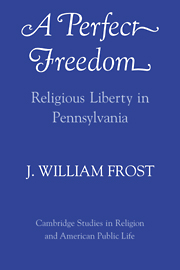Book contents
- Frontmatter
- Contents
- Acknowledgments
- Preface to This Paperback Reissue
- Introduction: The Pennsylvania Traditions of Religious Liberty
- I The Creation of Religious Liberty in Early Pennsylvania
- II Pacifism and Religious Liberty
- III The Clergy and Religious Liberty
- IV Religious Liberty in the Revolution
- V Religious Liberty and the Republic
- VI Politicians Debate Religious Liberty
- VII The Churches and Religious Liberty
- VIII The Legal Implications of Religious Liberty
- IX Religious Liberty and the Catholic and Jewish Minorities
- Epilogue: The Dismantling
- Notes
- Bibliography
- Index
Preface to This Paperback Reissue
- Frontmatter
- Contents
- Acknowledgments
- Preface to This Paperback Reissue
- Introduction: The Pennsylvania Traditions of Religious Liberty
- I The Creation of Religious Liberty in Early Pennsylvania
- II Pacifism and Religious Liberty
- III The Clergy and Religious Liberty
- IV Religious Liberty in the Revolution
- V Religious Liberty and the Republic
- VI Politicians Debate Religious Liberty
- VII The Churches and Religious Liberty
- VIII The Legal Implications of Religious Liberty
- IX Religious Liberty and the Catholic and Jewish Minorities
- Epilogue: The Dismantling
- Notes
- Bibliography
- Index
Summary
The settlers of Pennsylvania were among the first colonists to grapple with the complex spiritual, legal, political, and moral dilemmas arising from their belief in the separation of church and state or, as it is sometimes called, freedom of religion. This book is a history of this important reform movement in early Pennsylvania that created a pattern that would later influence and characterize American democracy.
The Pennsylvania experiment with religious freedom began with William Penn and endured with minor changes through the American Revolution, immigration, industrialization, and increasing secularization until the twentieth century. The Supreme Court in the 1950s declared unconstitutional the indirect aid that Pennsylvanians had long provided for religion by prayer and Bible reading in schools, posting the Ten Commandments, Sunday closing laws, and Christmas nativity displays on public property. The Court's decisions, designed to foster neutrality towards religion, were and remain highly controversial.
Colonial Pennsylvanians affirmed the believers' right to hold any religious belief so long as it did not lead to practices against the community's moral standards. No one would be compelled to attend religious services, to pay taxes or a tithe to a church, or to serve in the military if this conflicted with his faith. Quaker meetings, Protestant and Catholic churches, and synogogues gained the rights to self-government, to hold property, exemption from taxation, and knowledge that the courts would decide internal church disputes not on the basis of theology but the wishes of the congregation or charter of incorporation.
- Type
- Chapter
- Information
- A Perfect FreedomReligious Liberty in Pennsylvania, pp. xi - xiiPublisher: Cambridge University PressPrint publication year: 1990



